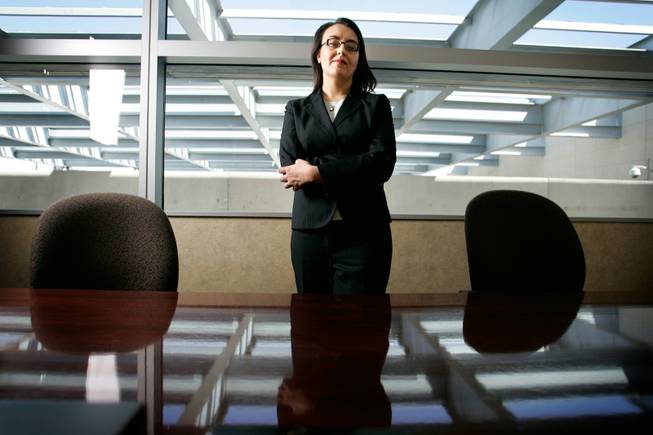
Angela Morrison, a 2005 outstanding graduate, is an attorney with the U.S. Equal Employment Opportunity Commission. Her offices are in the Lloyd D. George Federal District Courthouse.
Wednesday, March 26, 2008 | 2 a.m.
Four past recipients of the Outstanding Graduate Award talk about their proudest professional achievements since graduating from the William S. Boyd School of Law at UNLV.
Angela Morrison
Brian Bradford
Amy Beth Honodel
Leah Martin
Sun Archives
- UNLV gets a boost from Boyd (02-25-2005)
- Business leaders inducted into Nevada Hall of Fame (02-18-2005)
As it celebrates its 10th anniversary this year, Nevada’s only law school has earned its share of praise.
A youngster in the legal world, it nevertheless made U.S. News and World Report’s best law schools list with a tie for 100th place.
But when fans rave about what UNLV’s William S. Boyd School of Law has done for the state, they often speak in generalities — the school has helped foster a legal community here and brought prestige to the area, they say.
All of that means little to the average taxpayer. So, what has the law school done for Nevada?
Quite a bit, actually.
Boyd began turning out graduates in 2001, and in most of the years since then, more than 90 percent of employed alumni were working in Nevada nine months after graduation. More than 60 percent of all Boyd graduates are practicing in-state, according to figures provided by UNLV and the State Bar of Nevada.
Of 4,221 attorneys practicing in Clark County, about 12 percent came from Boyd.
“What they’re doing for the community, in my estimation, is they’re producing top-notch legal talent for this area,” said Eric Mann, executive director of the Clark County Bar Association.
Boyd graduates in Nevada include Angela Morrison, a trial attorney for the U.S. Equal Employment Opportunity Commission in Las Vegas. Like other alumni, she said going to Boyd allowed her to develop networks that helped her find in-state employment.
“I got my job here at the EEOC because a professor at the law school had heard about it through a friend,” Morrison said. “Otherwise I might not have found out about the opportunity.
“The way that a state law school works, it means that people end up staying in town once they graduate. That’s helpful.”
Morrison was named Boyd’s outstanding graduate of the Class of 2005. That award, given yearly to at least one graduate, recognizes scholastic achievement, leadership and other contributions to the law school. The Las Vegas Sun was able to locate seven of eight outstanding graduates of past years, and five are still in Nevada. A sixth intends to return and the seventh declined to comment.
Homegrown lawyers tend to be invested in the community, said David Clark, general counsel for the State Bar of Nevada.
“It gives us more local expertise,” he said. “Now the local community has its own crop of lawyers.”
Boyd graduates do a lot of pro bono legal work, providing low-income clients with legal counsel in matters related to consumer fraud, special education, housing and many other issues. About 15 percent of attorneys taking on new pro bono cases last year for people seeking help through the nonprofit Clark County Legal Services were Boyd alumni.
That dedication to public service could stem from Boyd’s community-oriented program, said Kimberly Abbott, Clark County Legal Services’ pro bono project director.
Boyd students are required to participate in public service programs, with many teaming up to conduct free workshops for members of the public on topics ranging from immigration law to family and bankruptcy matters.
Students can also participate in law clinics that allow them, under the supervision of faculty members, to represent clients in court. Clinic students have represented people in 677 cases.
Frank Sullivan, a juvenile hearing master who presides over child abuse and neglect cases, often sees Boyd students working with kids in the courtroom.
Because of the clinic, “children’s voices are being heard,” he said.
David Thronson, who oversees clinical studies at Boyd, said students and faculty members are often eager to take on the types of pro bono cases seasoned lawyers don’t want to tackle.
A poor client whose case has dragged on for years can find it nearly impossible to secure an attorney’s help, Thronson said. Lawyers do not want to read through thick case files without compensation.
But to students, the stacks of paperwork associated with complicated cases are a rich cache of information that can provide insight into how the legal process works, Thronson said.
Students have helped undocumented children in foster care become legal permanent residents of the United States. Another client earned citizenship status last year after clinic participants represented her. In that case, the woman had been waiting for two years to become a citizen though she had completed all the necessary paperwork.

Join the Discussion:
Check this out for a full explanation of our conversion to the LiveFyre commenting system and instructions on how to sign up for an account.
Full comments policy